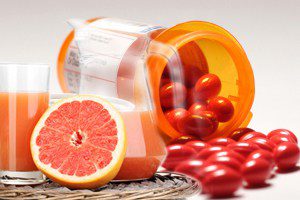
Health officials and researchers in Canada are reiterating a warning they issued 20 years ago about the drug interaction risks posed by grapefruit juice. The Toronto Star reports that the Canadian Medical Association Journal has published data showing that 44 prescription drugs – many of them some of the most taken drugs on the market […]
 Health officials and researchers in Canada are reiterating a warning they issued 20 years ago about the drug interaction risks posed by grapefruit juice.
Health officials and researchers in Canada are reiterating a warning they issued 20 years ago about the drug interaction risks posed by grapefruit juice.
The Toronto Star reports that the Canadian Medical Association Journal has published data showing that 44 prescription drugs – many of them some of the most taken drugs on the market – could cause dangerous interactions with ordinary grapefruit. Amplifying these dangers are that many of these drugs are commonly taken by people who are more likely to eat grapefruit or drink grapefruit juice, especially on a daily basis.
This latest study examining the potential drug interaction risks posed by grapefruit is an update to a study conducted more than 20 years ago in Canada that was published in the leading journal, The Lancet. At that time, just 17 drugs on the market posed a dangerous interaction risk with grapefruit juice. Because the number of drugs that carry such a risk has jumped so significantly in a short time prompted this revamped study.
Researchers found that most people who participated in the study were unaware of any potential risks of eating grapefruit or drinking its juice. And Dr. David Bailey, the lead author of the study, notes that among the drugs which pose a serious interaction risk, some are “highly prescribed and are essential to the treatment of important or common medical conditions.”
Some of the drugs which pose this risk are used in the treatment of cancer, like Crizotinib and Pazopanib. Antibiotics like Erythromycin and Quinine also pose serious interaction risks with grapefruit, as do cardiovascular treatments such as Apixaban and Felodipine.
Sudden death could occur to people who take these commonly prescribed drugs and others mainly due to the risk of Torsades de pointes, a condition that affects the heart. Other people who’ve suffered a serious and sometimes fatal interaction caused by the prescription drugs they were taking and grapefruit juice experienced acute kidney failures, respiratory failure, severe gastrointestinal bleeding episodes, bone marrow suppression, and renal toxicity, The Star reports.
Eating grapefruit or drinking a glass or grapefruit juice reduces the body’s ability to absorb drugs in the bloodstream. The Star reports, based on the findings in this latest study, that grapefruit juice suppresses the enzyme furanocoumarins and drugs are prescribed in doses based on that enzyme’s ability to dissolve the drug over a period of time.
Researchers also noted that some other fruits contain the same chemical make-up as grapefruit and believe they can infer that they’d act similarly against a drug’s efficacy, and potentially lead to what they’re calling “accidental overdoses” of drugs caused by the suppression of furanocoumarins. Limes and Seville oranges may also carry these same risks.


